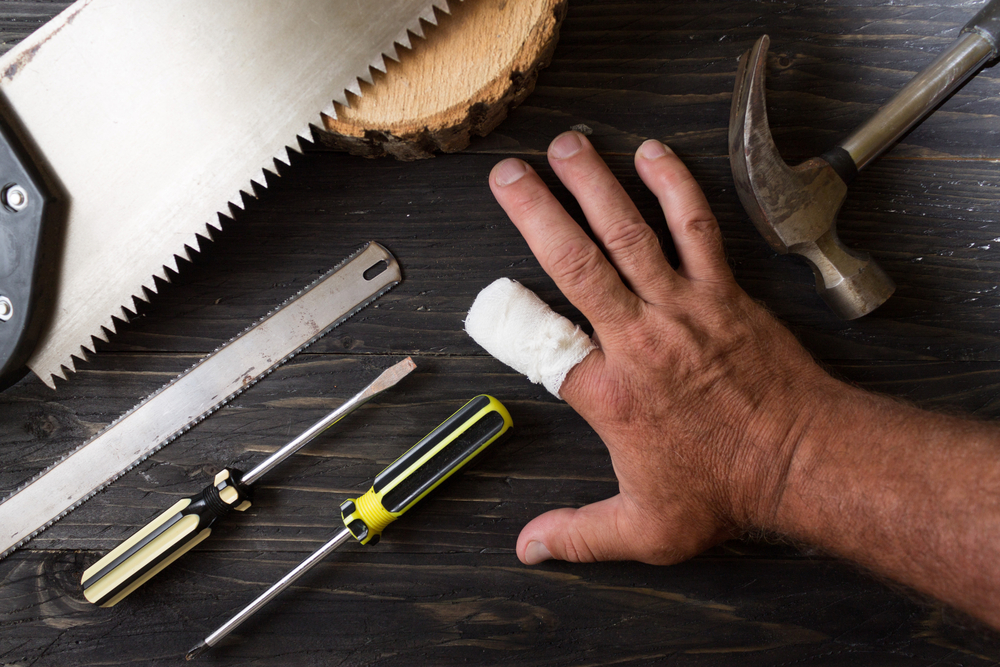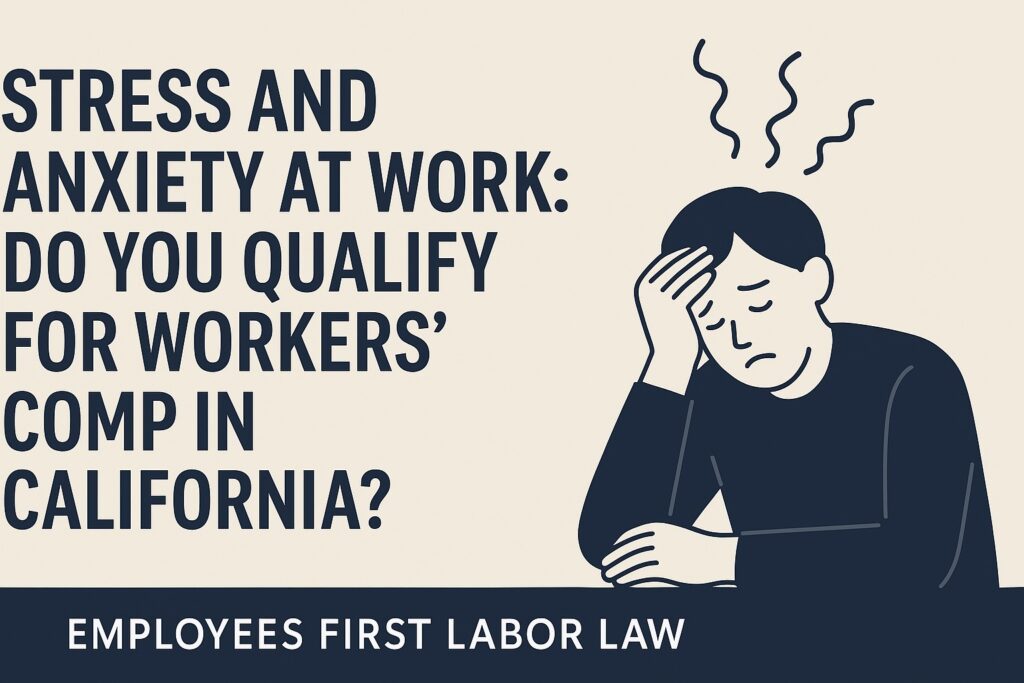
Suffering an amputation at work is life-changing. You may be facing weeks or months of recovery, multiple surgeries, expensive prosthetic devices, or even the need to find a new career. It’s traumatic physically, emotionally, and financially. But under California law, you are entitled to workers’ compensation benefits if your amputation occurred due to your job.
At Employees First Labor Law, we specialize in fighting for injured workers—especially those who’ve suffered catastrophic injuries like amputations. Here’s what you need to know about your rights and what you’re entitled to after an amputation at work.
What Types of Amputations Are Covered by Workers’ Comp in California?
Any work-related amputation injury is covered, including:
- Finger or thumb amputations
- Partial or full hand amputations
- Arm amputations above or below the elbow
- Leg amputations above or below the knee
- Foot or toe amputations
- Multiple limb amputations
It doesn’t matter if the injury occurred in a construction accident, factory incident, machinery malfunction, or vehicle crash — if it arose out of and in the course of your employment, you’re covered.
What Benefits Are You Entitled to After an Amputation?
California workers’ compensation benefits are designed to support injured employees throughout treatment and recovery, and into the future. Here’s a breakdown of what you may be entitled to:
Temporary Disability (TD) Benefits
If your injury prevents you from working, you can receive temporary wage replacement:
- Typically 2/3 of your average weekly wage
- Up to $1,619.15/week in 2025
- Paid until you return to work or reach maximum medical improvement (MMI)
Permanent Disability (PD) Benefits
Once you’ve reached MMI, the doctor will assign a Permanent Disability Rating (PDR), which reflects your long-term loss of function. The more serious the amputation, the higher the PDR.
This translates into a set number of weeks of payments depending on:
- Your PDR percentage
- Your age and occupation
- Your earnings at the time of injury
For major amputations (arms, legs), you could qualify for 100% disability and lifetime payments.
Lifetime Medical Care
You are entitled to medical treatment for life related to your amputation, including:
- Emergency surgery and hospitalizations
- Prosthetics and future replacements
- Physical therapy and rehabilitation
- Pain management and medications
- Psychological therapy
Insurance companies may try to limit or delay these treatments—don’t let them.
Supplemental Job Displacement Benefit (SJDB)
If your employer can’t offer you modified or alternative work after your recovery, you qualify for:
- A $6,000 vocational retraining voucher
- $5,000 additional payment through the Return-to-Work Supplement Program
We help clients use this benefit to find new career paths after losing a limb.
Average Workers’ Comp Amputation Settlement Amounts in California
While each case is unique, here are rough ranges for average settlement values:
| Injury Type | Estimated Settlement Range |
|---|---|
| Finger (Partial to Full) Amputation | $25,000 – $80,000 |
| Thumb Amputation | $40,000 – $120,000 |
| Hand Amputation | $100,000 – $350,000 |
| Below-Elbow Amputation | $150,000 – $500,000 |
| Above-Elbow Amputation | $200,000 – $750,000 |
| Below-Knee Amputation | $175,000 – $600,000 |
| Above-Knee Amputation | $250,000 – $1,000,000+ |
💡 Note: These figures are based on real California cases and include estimated permanent disability, future medical, and wage loss — but do not include pain and suffering, as workers’ comp does not cover that.

What If the Insurance Company Denies My Claim?
Unfortunately, insurance carriers may try to:
- Dispute the connection between your job and the amputation (AOE/COE)
- Downplay the level of permanent disability
- Delay authorization for prosthetics or critical surgeries
- Push you to settle for less than you deserve
That’s where we come in.
At EFLL, we fight for injured workers and hold employers and insurers accountable. We make sure your disability is fairly rated, your treatment is not delayed, and you receive the full value of your case—whether through regular benefits or a lump-sum settlement.
Psychological Support Is Also Covered
Many workers who suffer amputations also experience serious emotional trauma. You may be entitled to psychiatric benefits if you are diagnosed with:
- Depression
- Post-Traumatic Stress Disorder (PTSD)
- Anxiety disorders
- Adjustment disorders
These conditions often arise when you experience job loss, chronic pain, or loss of independence. If documented properly, they are compensable under California workers’ compensation law.
Can You Sue Outside of Workers’ Comp for an Amputation?
Sometimes. While workers’ compensation is generally the exclusive remedy against your employer, you may be able to pursue a separate civil lawsuit under certain circumstances — and these cases can be worth millions.
You may have a third-party claim if:
- A subcontractor, vendor, or property owner caused or contributed to the accident
- The injury involved defective machinery, equipment failure, or lack of proper safety features
- The employer committed serious and willful misconduct, such as ignoring known hazards or failing to follow Cal/OSHA regulations
Unlike workers’ comp, civil lawsuits allow you to recover:
- Pain and suffering
- Full lost wages and loss of earning capacity
- Punitive damages in cases of extreme recklessness
EFLL Has the Experience to Handle Both
At Employees First Labor Law, we don’t just handle workers’ comp — we also have a dedicated civil litigation team experienced in third-party liability, product defect, and serious & willful misconduct cases. We know how to strategically pursue both claims at once to maximize your total recovery.
If your amputation was caused by negligence or dangerous equipment, we’ll investigate every avenue to hold all responsible parties accountable — not just your employer.
What Should You Do After a Workplace Amputation?
- Get Immediate Medical Attention – Your health comes first.
- Report the Injury – Notify your employer as soon as possible.
- File a DWC-1 Claim Form – To begin your workers’ comp claim.
- Consult a Workers’ Comp Attorney – These cases are complex and high-value — don’t go it alone.
Returning to Work After an Amputation: Your Rights and Accommodations
If you’re able and willing to return to work after an amputation, your employer must engage in a good faith interactive process to determine whether reasonable accommodations can help you perform your essential job duties.
Under both California’s Fair Employment and Housing Act (FEHA) and the federal Americans with Disabilities Act (ADA), amputees are considered individuals with a disability—and employers must take steps to support your reintegration into the workplace.
Examples of Reasonable Accommodations:
- Modified tools or machinery for single-handed use
- Adjustable desks, ramps, or ergonomic equipment
- Modified duties (e.g., less lifting, no climbing)
- Reassignment to an open position
- Flexible work schedules or remote options
- Longer break times or rest periods
- Time off for prosthetic fittings, therapy, or surgeries
The Interactive Process
California law requires your employer to engage in a timely, good-faith dialogue about your limitations and what accommodations are feasible. They cannot legally ignore your requests or retaliate against you for asserting your rights.
If you feel your employer is refusing to accommodate your amputation or is trying to force you out, contact us right away. We regularly handle both workers’ comp and disability discrimination claims under FEHA.

Why Choose Employees First Labor Law?
At Employees First Labor Law, we specialize in catastrophic workplace injury cases — including amputation, paralysis, and death claims. We’ve recovered millions for California workers, and we know how to maximize your benefits and fight for every dollar you deserve.
✅ Contact Us for a Free Amputation Case Review
If you or a loved one has suffered an amputation on the job, call us today for a free consultation. There are strict time limits, and you only get one chance to settle your case right.
📞 (310) 853-3461
📩 Or fill out our confidential contact form



